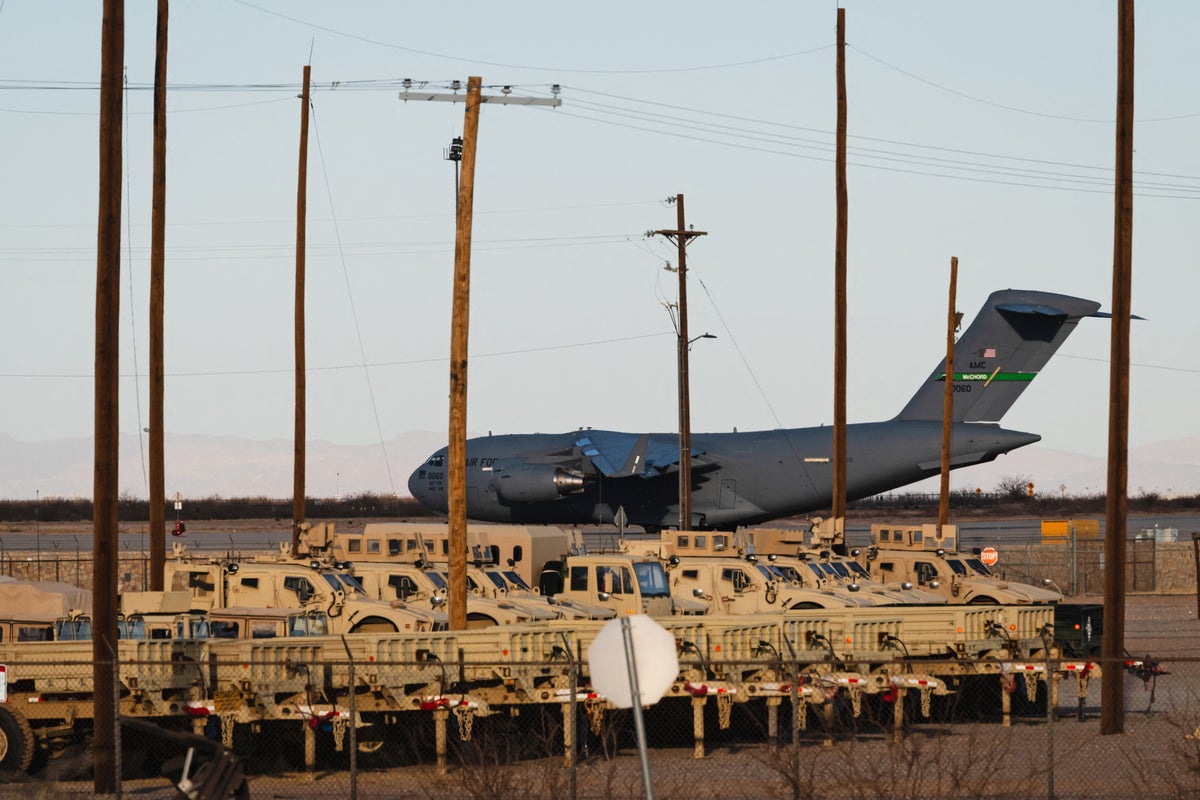CNN
—
The retired Air Force general announced as the next chairman of the Joint Chiefs of Staff by President Donald Trump after the abrupt Friday night firing of his predecessor is a respected career F-16 pilot who is described by current and former officials who served with him as a professional with a “strong moral center.”
John Dan “Razin” Caine, who was first noticed by Trump in 2018 for his involvement in the fight against ISIS, has spent much of his career working in special operations and with the intelligence community and is mild-mannered, humble and apolitical, the officials said. He has long flown under the radar given the highly classified nature of his work — and he preferred it that way, the officials said.
“There is a little bit of a narrative out there that he was picked because he’s a partisan guy,” a military official who served with Caine and has known him for over a decade told CNN. “In my personal experience and professional experience, I’ve never seen any indication that, and knowing him, he’s never been partial to any political party or mentioned anything about politics in our time together.”
Caine, who retired in December as a three-star lieutenant general, was thrust into the center of a political firestorm when Trump abruptly announced Friday that he would replace Gen. Charles Q. Brown, who had served as Joint Chiefs chairman since October 2023.
It’s rare for a retired general to be recalled to active service, but it has happened before. Army Gen. Peter Schoomaker, for example, was recalled to become Army chief of staff in 2003.
It’s also highly unusual for a three-star general to receive their fourth star upon being elevated to chair, the country’s most senior military officer. Past chairmen have received their fourth star by first leading a combatant command or serving as a service chief before becoming the US’ top general and principal military adviser to the president.
But Caine has been in unexpected positions before. On the morning of 9/11, he was serving at Andrews Air Force Base near Washington, DC. Though he wasn’t initially scheduled to fly that day, he ultimately became the mission commander over the capital, armed with air-to-air missiles on alert for threats to the nation, he recalled in an interview with “The Afterburn Podcast” several weeks ago.
“It’s about being willing to protect and defend this nation and to work alongside incredible professionals who are equally willing to go to the mat in defense of our nation,” Caine said.
Trump has raved about Caine for years after the two met in Iraq during the president’s first term. At the time, Caine was serving as the deputy commander of US Central Command’s Special Operations Component and deputy commander of Special Operations Task Force-Operation Inherent Resolve in Iraq.
In remarks at the Conservative Political Action Conference in 2019, the president described Caine as being out of “central casting” and recalled that Caine told him when they met in Iraq that the US could have the campaign against ISIS “totally finished in one week.”
“I said, ‘Why didn’t my other generals tell me that? Why didn’t they tell me that?’” Trump said in 2019. In a post on Truth Social on Friday night, Trump called Caine a “warfighter” who was “instrumental in the complete annihilation of the ISIS caliphate.”
Trump has also claimed Caine said he “loved” Trump and would “kill for you” while donning a “Make America Great Again” hat.
But the military official who served with Caine said Saturday that Caine “doesn’t have a MAGA hat; he’s never put one on.”
The official added that Caine, prior to accepting the chairmanship, wanted to make sure Brown was “respectfully and personally taken care of.”
“Everything I’ve known of Gen. Caine over the last decade has been marked by character, integrity and humility,” the military official said. “I’ve never seen him not do the right thing. Always making judgments about the mission. Never been a guy who cowers from difficult conversations or hard calls on the battlefield.”
Caine, an F-16 pilot who has flown more than 150 combat hours, commissioned in October 1990 through the Reserve Officers’ Training Corps program at the Virginia Military Institute, according to his official biography. His father was also a fighter pilot, and Caine referred to it as “the family business” in his interview with “The Afterburn.”
He had an unusual career trajectory, rising from a fighter pilot in the Air National Guard to the senior levels of Joint Special Operations Command. Caine joined a venture capital firm called Shield Capital after he retired in December and was a “serial entrepreneur and investor” from 2009 to 2016 while serving part time in the National Guard, according to his official Air Force biography.
Among his military awards and decorations are the Distinguished Flying Cross, which is awarded for heroism while in flight, the Defense Superior Service Medal, and a Bronze Star with bronze oak leaf cluster.
Caine acknowledged his unusual career path in the podcast interview, and said he entered the Special Operations Forces community after deploying with them many times over the years.
“What got me into the SOF community was relationships and deploying together,” he said. “It really is all about relationships.” In the interview, Caine recalled his experience with SOF really began when he helped with the air operations planning to hunt Iraqi Scud missiles during Operation Iraqi Freedom.
He said he learned early in his career to be “humble, credible and approachable.”
“I was unable to, and never really would, drink my own Kool-Aid,” Caine said.
In the podcast’s video portion, Caine can be wearing several bracelets in memory of the fallen from past wars and those he’s served with — a black one that is an interagency remembrance bracelet; a blue one to recognize the 121 fallen from Air America, the CIA’s covert airline operated during Vietnam; and a green one in memory of the more than 60 service members he served with or who served under him who were killed in combat, the military official told CNN.
While usually self-effacing, Caine was “super aggressive” in the cockpit as a pilot, pushing the aircraft to its limits and generally “a bit of a wild man” while flying, the military official said. That earned him the call sign “Razin” from his squadron commander at the time — a play on his last name and the phrase “raising Cain,” which is used to describe someone who is being rowdy or disruptive.
Beginning in 2021, toward the end of Caine’s career, he served as the associate director for military affairs at the Central Intelligence Agency — the agency’s primary liaison to the Defense Department. Prior to that, he helped oversee some of the Defense Department’s most sensitive intelligence and operations at the Pentagon.
In stark contrast to Trump, who has long harbored a deep distrust of the intelligence community, Caine has described working at the CIA from 2021 to 2024 as one of the great honors of his career.
“I have no idea how I got picked, but boy am I grateful that I did,” Caine told “The Afterburn,” calling the agency “a very special place.”
“Working at CIA is a bit like Fight Club: You don’t talk about Fight Club,” he said. “But there are world-class professionals over there, every single day, getting after it in ways that we can’t even imagine. And the honor and privilege of serving with each of them is very near and dear to me. I woke up every day while working in this job to figure out how I was going to earn the privilege of serving there.”
Retired Gen. Frank McKenzie, the former head of US Central Command, told CNN he worked “a number of highly sensitive operations” with Caine when Caine was at the CIA.
“I found him to be exceptionally talented, very professional and a good officer in every way,” McKenzie said Saturday, adding that Caine is outgoing and gregarious with “a strong moral center.”
Caine has not mentioned politics in any of the few public comments he has made over the years. But in the podcast interview, he touted the need to reform the Pentagon’s acquisition process — something Secretary of Defense Pete Hegseth has also called a priority in recent years.
“Our ability as a warfighting nation to pivot at speed, to stay ahead of these emerging technologies, is going to be really important in the future,” Caine said. “There’s a whole bunch of things that we need to do better as a joint force and as a Department of Defense along the lines of acquisition reform so that we can make sure that those young (privates first class) and E-1s and E-2s and (noncommissioned officers) have the kit and capability that they need.”


